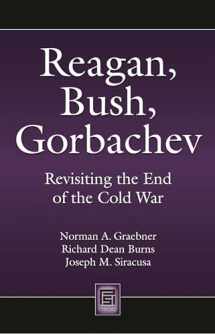
Reagan, Bush, Gorbachev: Revisiting the End of the Cold War (Praeger Security International)
ISBN-13:
9781440836343
ISBN-10:
1440836345
Author:
Norman A. Graebner, Richard Dean Burns, Joseph M. Siracusa
Publication date:
2008
Publisher:
Praeger
Format:
Paperback
188 pages
FREE US shipping
Book details
ISBN-13:
9781440836343
ISBN-10:
1440836345
Author:
Norman A. Graebner, Richard Dean Burns, Joseph M. Siracusa
Publication date:
2008
Publisher:
Praeger
Format:
Paperback
188 pages
Summary
Reagan, Bush, Gorbachev: Revisiting the End of the Cold War (Praeger Security International) (ISBN-13: 9781440836343 and ISBN-10: 1440836345), written by authors
Norman A. Graebner, Richard Dean Burns, Joseph M. Siracusa, was published by Praeger in 2008.
With an overall rating of 3.6 stars, it's a notable title among other
books. You can easily purchase or rent Reagan, Bush, Gorbachev: Revisiting the End of the Cold War (Praeger Security International) (Paperback) from BooksRun,
along with many other new and used
books
and textbooks.
And, if you're looking to sell your copy, our current buyback offer is $0.3.
Description
This work is a contemporary chronicle of the Cold War and offers an analysis of policy and rhetoric of the United States and Soviet Union during the 1980s. The authors examine the assumptions that drove political decisions and the rhetoric that defined the relationship as the Soviet Union began to implode.This work demonstrates that while the subsequent unraveling of the Soviet empire was an unintended side effect of Mikhail Gorbachev's reforms, termination of the Cold War was not. Ronald Reagan deserves full credit for recognizing Gorbachev's sincerity and his determination to change the direction of Soviet policies. For this, Reagan felt the full wrath of anticommunist hawks for doing business with a communist leader. But it was Gorbachev who concluded the superpowers had become mesmerized by ideological myths which ruled out any meaningful discussions of a possible accommodation of political issues for more than four decades. The evidence is compelling that Gorbachev himself broke the Cold War's ideological straight jacket that had paralyzed Moscow and Washington's ability to resolve their differences. Though politically weakened, Gorbachev conceded nothing to U.S. military superiority. Never did he negotiate from a position of weakness. In doing so, the last Soviet leader faced even greater political and physical risk. Without Gorbachev the end of the Cold War could have played out very differently and perhaps with great danger.


We would LOVE it if you could help us and other readers by reviewing the book
Book review

Congratulations! We have received your book review.
{user}
{createdAt}
by {truncated_author}


